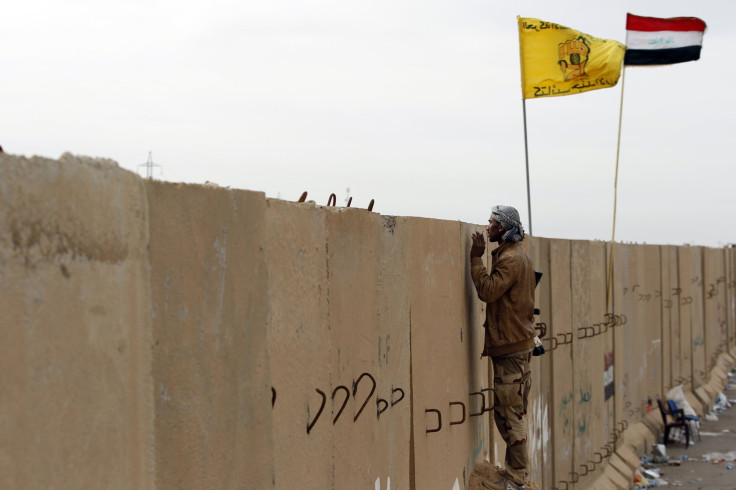On The Frontlines At The Battle for Tikrit, Waiting - And Waiting Some More As Fight Is Stalled

SAMARRA, Iraq -- Battalion leaders within the largest volunteer military force in Iraq sat around a table at their base here on Thursday night, watching Iraqi TV news about U.S. airstrikes in Tikrit -- the very airstrikes that were supposed to come just hours before the launch of a ground offensive to retake the city from the Islamic State group. The men knew they would be in the vanguard of that battle and were awaiting, any minute, the order to attack. But their commanders were silent, and the officers were all dialing on their phones, trying to get more information about what tomorrow would look like for them.
If tomorrow is anything like today, their men will drive to their posts on the outskirts of Tikrit and wait while the airstrikes hit the city in front of them. And keep waiting. Because, if tomorrow is like today, the men of the Hashd al Shabi, also known as Iraq's Popular Mobilization Committee, will play no role in fighting the Islamic State group in Tikrit.
"I call the next part Tikrit Chapter Two," said Karim Nouri, the spokesman for Hashd al Shabi, in an interview here Thursday. "The city is surrounded, and we are ready to begin fighting again. But the Americans want to bomb first before we go in. That's why we are waiting. But we don't need the U.S. Iraq has its own air force."
The U.S. began bombing the Islamic State group (also known as ISIS or ISIL) in Tikrit on Wednesday night, the fighters here say, because it thought the militias were not hitting ISIS targets accurately within the city.
"There are so many IEDs [improvised explosive devices] and it is not safe for us to go in," Nouri said. So the militias remain on the outskirts, firing rockets into town before retreating: "We have drones that fly over the city and locate ISIS positions, and that's where we fire the rockets." But there is no really credible way for the Iraqi militias to know how effective their artillery fire is and how many ISIS fighters remain in the city. That's why Prime Minister Haider al-Abadi requested U.S. air support, some fighters said.
Abadi traveled to the outskirts of Tikrit on Wednesday to try to convince the Shiite militias to stay out of the fight until the airstrikes finished. Some battalions complied, others refused. But even those battalions that refused to wait, such as Kataib Hezbollah, an Iran-backed group designated as a foreign terrorist group by the U.S., could not launch their own offensive without the other militias knowing; all of them share bases, ammunition and weapons. So everybody stayed put.
The disagreement between Baghdad and the Shiite militias here has caused confusion among the soldiers on the front lines. No one knows when or if they will begin fighting in Tikrit again.
Men were dispatched from Baghdad on Thursday morning after the U.S. began striking ISIS in Tikrit. All of them expected to begin their offensive that day. But now, nearly two days later, they have seen almost no action on the front lines, and they can do little but wait for word to advance.
On Thursday, black smoke billowed up from Tikrit where the U.S.-led coalition’s planes had hit. In al Dour, a small town just outside the city, the men of Hashd al Shabi sat in their parked trucks, watching.
Some men from the Badr Brigade, another major Shiite group, sat on top of their tanks and fired random bullets out of boredom. With each shot, the men would giggle and shove the next person into position to shoot.
Meanwhile, at a major checkpoint down the road, men from Kataib Hezbollah were busy taking cell phones and cameras from vehicles passing through.
"No picture. Give me your phone. Give it to me now," one of the Hezbollah soldiers said while swiping two phones from young boys on a bus.
The atmosphere on the outskirts of Tikrit is tense not only because heavily armed soldiers have been waiting idle for days, but because there is no clear understanding about the responsibility of each battalion. Some days the Badr Brigade men will patrol the streets in al Dour with the police, other days they will man checkpoints. Some days the men in Kataib Hezbollah will transport fighters to a base near Tikrit, other days they will deliver supplies.
But perhaps the most confusing part of the battle for Tikrit is the impression that each battalion controls random, and constantly changing, pieces of land on the front lines.
Each checkpoint is manned by a different police unit or militia, which means there is no central understanding of who is securing the area around the battlefield. There is no central command to direct who is let in and out of the area.
That beccame clear when, driving from Samarra to Tikrit with an embedded reporter, a Hashd al Shabi convoy was stopped by the Badr Brigade and Kataib Hezbollah, and asked for identification papers.
"We are Hashd al Shabi, let us through. We are with you," one man yelled out his window at the fighters manning the checkpoint. After about five minutes of discussion, the vehicles were finally able to pass and make our way closer to Tikrit.
But so far, the mood among the fighters is buoyant. Spokesman al Nouri said that his men are ready to begin fighting anytime, and that once their part of the offensive begins, it would only take two days to completely liberate the city.
"Ninety percent is already under our control," he said. "All we need to do is get inside and finish what we started several weeks ago."
© Copyright IBTimes 2024. All rights reserved.




















